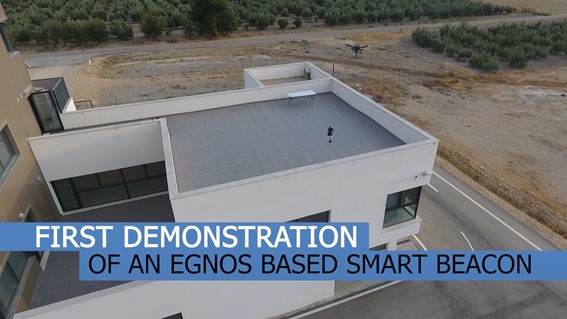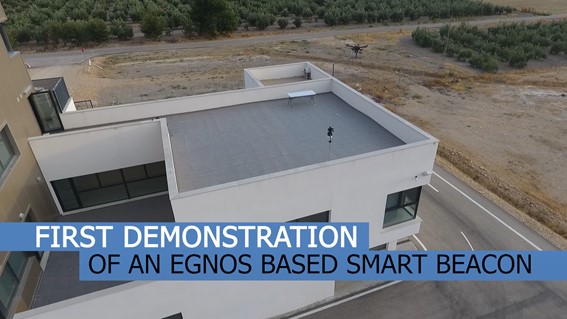PRESS RELEASE
TRACE drone-flight, a successful take-off!
The first drone equipped within the TRACE project has been tested bearing an EGNOS-enabled beacon that allows the identification of the aircraft while guaranteeing accurate, robust positioning and improving separation.
The drone lifted-off the ground at the ATLAS experimental flight centre in Villacarrillo, Spain, an aerodrome equipped for carrying out flight tests with unmanned aircraft systems such as RPAS and drones.
The general comment from the attendants was that TRACE do will demonstrate the advantages and benefits provided by EGNOS in the drone field. The remote identification will be the key factor in the safe development of the future U-space.
The TRACE project team - a project funded by the GSA EGNOS Adoption in Aviation grant- designed and developed a smart beacon that leverages the robust signal corrections of EGNOS to improve the positioning accuracy and thus the safety of drone operations at very low altitudes.
Using enhanced signals coming from EGNOS, the EU’s regional satellite-based augmentation system, TRACE supports the safe and effective integration of drones into U-space by providing essential services like e-registration, e-identification and pre-tactical geofencing among others. The smart beacon which allows for the remote identification of drones flying at a very low altitude (VLL – Very Low Level) will enable safer integration of drones into airspace through the use of U-space, making it easier for traditional aviation pilots to know the position of drones more accurately. The smart beacon will also enable better traffic separation when integrated with U-Space services, thanks to EGNOS.
TRACE project is led by ALTER TECHNOLOGY, and is a result of collaboration among renowned European companies such as UNIFLY (Belgium), PILDO LABS and FADA-CATEC (Spain).
TRACE drone-flight, a successful take-off!
The first drone equipped within the TRACE project has been tested bearing an EGNOS-enabled beacon that allows the identification of the aircraft while guaranteeing accurate, robust positioning and improving separation.
The drone lifted-off the ground at the ATLAS experimental flight centre in Villacarrillo, Spain, an aerodrome equipped for carrying out flight tests with unmanned aircraft systems such as RPAS and drones.
The general comment from the attendants was that TRACE do will demonstrate the advantages and benefits provided by EGNOS in the drone field. The remote identification will be the key factor in the safe development of the future U-space.
The TRACE project team - a project funded by the GSA EGNOS Adoption in Aviation grant- designed and developed a smart beacon that leverages the robust signal corrections of EGNOS to improve the positioning accuracy and thus the safety of drone operations at very low altitudes.
Using enhanced signals coming from EGNOS, the EU’s regional satellite-based augmentation system, TRACE supports the safe and effective integration of drones into U-space by providing essential services like e-registration, e-identification and pre-tactical geofencing among others. The smart beacon which allows for the remote identification of drones flying at a very low altitude (VLL – Very Low Level) will enable safer integration of drones into airspace through the use of U-space, making it easier for traditional aviation pilots to know the position of drones more accurately. The smart beacon will also enable better traffic separation when integrated with U-Space services, thanks to EGNOS.
TRACE project is led by ALTER TECHNOLOGY, and is a result of collaboration among renowned European companies such as UNIFLY (Belgium), PILDO LABS and FADA-CATEC (Spain).

Take off - first demonstrator of TRACE Project
The drone market is booming, and it is expected to outstrip any other user base in the aviation market. According to estimations, revenues from drone-based services are expected to exceed 150 million euros by 2023. GNSS is a key enabling technology for drones and it is expected that its role will continue to grow. Solutions like TRACE that utilizes European GNSS, namely EGNOS and Galileo are real differentiators that can be leveraged in order to safely integrate drones into non-segregated airspace and into the U-space. The contribution of EGNSS is explored at the Drone Operations White Paper published by the GSA.
What is EGNOS?
The European Geostationary Navigation Overlay Service (EGNOS) is Europe's regional satellite-based augmentation system (SBAS) that is used to improve the performance of global navigation satellite systems (GNSSs), such as GPS and in the future Galileo. It has been deployed to provide safety of life navigation services to aviation, maritime and land-based users over most of Europe.
ABOUT
ALTER TECHNOLOGY is a quality driven company providing engineering and test services for electronic systems and E.E.E. components, within the space and harsh environment markets. ALTER works in many markets including, but not limited to, Aerospace (including RPAS/Drones), Security, Transport, Telecom, Energy, Health & Safety and Automotive.
FADA-CATEC is the Advanced Aerospace Technologies Center which promotes and develops the creation of technological knowledge and its transfer to the productive aerospace industry, with a large activity in the development of drone technologies and the entity that manages ATLAS test centre.
PILDOLABS is an engineering company specialized in delivering top of the edge technology and services within the aeronautics and aerospace sectors.
UNIFLY is a software company with a platform for the safe integration of drones into the airspace. Award-winning spin-off company of VITO (Flemish institute for technological research) specialized in aviation software development.
The European GNSS Agency (GSA)
The European GNSS Agency (GSA), is the European Union Agency in charge of managing operations, security and service provision for Europe’s Global Navigation Satellite Systems (GNSS), Galileo and EGNOS. By working with stakeholders, industry, service providers and user communities, the GSA ensures the highest return on European GNSS investment, multiplying the benefits of space applications for European citizens and business, boosting innovation and competitiveness, and securing sustainable economic growth.
Press Contact:
Marcia Arizaga
ALTER TECHNOLOGY TÜV NORD
Communications
marcia.arizaga@altertechnology.com
Tel: 91 806 04 72
Marie Ménard
GSA Communication officer
Marie.Menard@gsa.europa.eu
Tel: +420 602 619 776
The drone market is booming, and it is expected to outstrip any other user base in the aviation market. According to estimations, revenues from drone-based services are expected to exceed 150 million euros by 2023. GNSS is a key enabling technology for drones and it is expected that its role will continue to grow. Solutions like TRACE that utilizes European GNSS, namely EGNOS and Galileo are real differentiators that can be leveraged in order to safely integrate drones into non-segregated airspace and into the U-space. The contribution of EGNSS is explored at the Drone Operations White Paper published by the GSA.
What is EGNOS?
The European Geostationary Navigation Overlay Service (EGNOS) is Europe's regional satellite-based augmentation system (SBAS) that is used to improve the performance of global navigation satellite systems (GNSSs), such as GPS and in the future Galileo. It has been deployed to provide safety of life navigation services to aviation, maritime and land-based users over most of Europe.
ABOUT
ALTER TECHNOLOGY is a quality driven company providing engineering and test services for electronic systems and E.E.E. components, within the space and harsh environment markets. ALTER works in many markets including, but not limited to, Aerospace (including RPAS/Drones), Security, Transport, Telecom, Energy, Health & Safety and Automotive.
FADA-CATEC is the Advanced Aerospace Technologies Center which promotes and develops the creation of technological knowledge and its transfer to the productive aerospace industry, with a large activity in the development of drone technologies and the entity that manages ATLAS test centre.
PILDOLABS is an engineering company specialized in delivering top of the edge technology and services within the aeronautics and aerospace sectors.
UNIFLY is a software company with a platform for the safe integration of drones into the airspace. Award-winning spin-off company of VITO (Flemish institute for technological research) specialized in aviation software development.
The European GNSS Agency (GSA)
The European GNSS Agency (GSA), is the European Union Agency in charge of managing operations, security and service provision for Europe’s Global Navigation Satellite Systems (GNSS), Galileo and EGNOS. By working with stakeholders, industry, service providers and user communities, the GSA ensures the highest return on European GNSS investment, multiplying the benefits of space applications for European citizens and business, boosting innovation and competitiveness, and securing sustainable economic growth.
Press Contact:
Marcia Arizaga
ALTER TECHNOLOGY TÜV NORD
Communications
marcia.arizaga@altertechnology.com
Tel: 91 806 04 72
Marie Ménard
GSA Communication officer
Marie.Menard@gsa.europa.eu
Tel: +420 602 619 776


